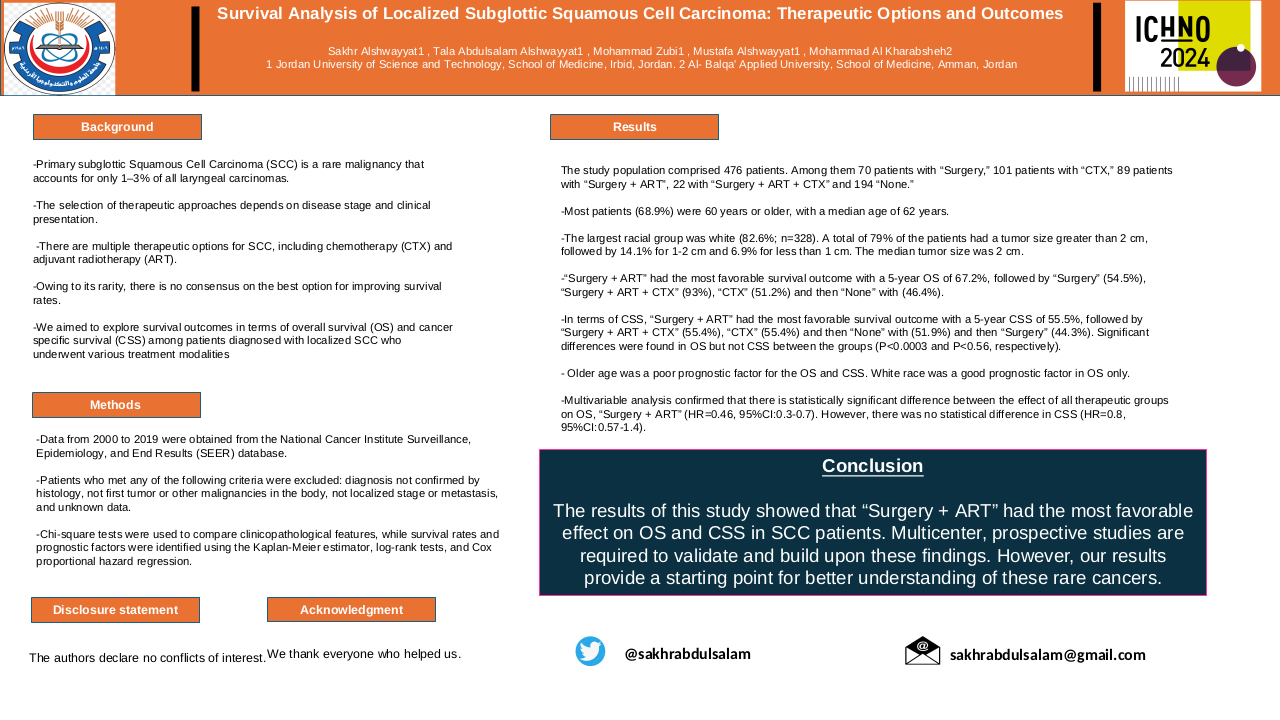Quality of life after radiation therapy for laryngeal cancer in the North of Morrocco
Purpose/Objective
To evaluate the quality of life in patients treated for locally advanced laryngeal cancer with surgery, radiation therapy or both
Material/Methods
A retrospective study conducted at the radiation therapy department of Mohamed 6 University Hospital of Tangier. This study included patients treated for non-metastatic laryngeal cancer between April 2017 and April 2023, who received radiation therapy during their course of treatment. Treatment modalities included either surgery followed by radiotherapy or laryngeal preservation (LP) strategy by concomitant chemoradiotherapy (CRT) or induction chemotherapy (IC) followed by CRT. Clinical data, treatment and follow-up results were gathered using the digitalized hospital network. All patients answered the EORTC QLQ H&N 35 questionnaire for quality of life in its approved Arabic version.
Results
40 patients were included in the study. Mean age was 62 +/- 12 years old. 50% of the patients had a stage IVA disease and 30% had a stage III cancer. Radiation therapy was administered in adjuvant setting for 75% of the patients. Amongst patients treated with surgery + radiotherapy, 50% had a stage IV disease.
Regarding dysphonia, 80% of patients considered they had a poor quality of voice. 45% of the patients found difficulties communicating with others. 66.7% of them described these difficulties as severe. In the LP group, 3 patients reported severe difficulties and they were all treated for a stage IVA disease: the choice of treatment modality was due to patients’ refusal of surgery for 2 of them. Voice restoration surgery was performed for 3 patients.
Pain issues were reported by 3 patients and nearly half of patients (45%) had dysphagia: 13 of them had surgery and 5 were treated following a LP strategy. A feeling of an abnormal rate of mucus secretion was found in 11.5% of the patients. Regarding sensory disorders (taste and odor), there was 1 case of dysgueusia reported: the patient was treated with IC + CRT.
Sexual life was worsened in 12.5% of patients (4 men and a woman), all of whom had a definitive tracheostomy. Issues reported were dyserection, lack of libido and a poorer quality of physical relations.
Conclusion
Quality of life is an important factor to consider in the choice of treatment setting, which has to be done according to the stage and international guidelines. Our study found that quality of voice is the main altered function after treatment according to patients, even when they have recovered their voice. Same results were found in the literature. Despite the mutilating treatment and the toxicity of irradiation, and as shown in the study, a decent quality of life can still be obtained for our patients, thus avoiding a poorer outcome of the cancer. Research in laryngeal cancer these days tends towards the improvement of quality of life without compromising survival results.
Guibed M. and al. "Quality of Life in patients treated for advanced hypopharyngeal ot laryngeal cancer." Eur Ann Otorhinolaryngology, Head Neck Dis. 2011, 128, 218-223Sadoughi B. and al. "Quality of life after conservative surgery for laryngeal cancer." Otolaryngology Clin North Am. 2015 Aug; 48, 665-65Babin E. and al. "Sex-related quality of life after total laryngectomy for cancer." Eur Ann Otorhinolaryngology, Head Neck Dis. 2023 May; 140: 121-126






